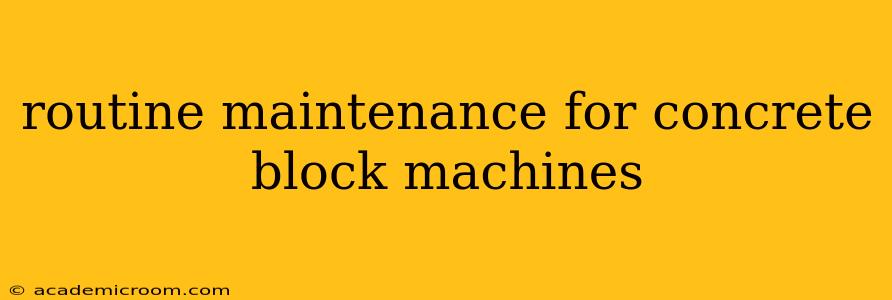Concrete block machines are vital pieces of equipment in the construction industry, demanding regular maintenance to ensure optimal performance, longevity, and safety. Neglecting routine maintenance can lead to costly repairs, production downtime, and even workplace accidents. This comprehensive guide outlines essential maintenance procedures to keep your concrete block machine running smoothly.
What is Involved in Concrete Block Machine Maintenance?
Routine maintenance for concrete block machines encompasses a range of tasks, from daily visual inspections to periodic component replacements. The specific procedures will vary depending on the machine's make, model, and operational environment. However, some core practices remain consistent across different models. These include:
- Regular cleaning: Removing debris and concrete residue is crucial to prevent block quality issues and machine malfunctions.
- Lubrication: Proper lubrication of moving parts reduces friction, extends component lifespan, and prevents premature wear.
- Component inspections: Regularly checking for wear, damage, or loose parts helps identify potential problems early on.
- Hydraulic system checks: Maintaining the hydraulic system is vital for the machine's smooth operation. This involves checking fluid levels, leaks, and filter conditions.
- Electrical system checks: Ensuring the electrical system is functioning correctly is crucial for safety and operational efficiency. This includes checking wiring, connections, and control components.
How Often Should I Perform Maintenance?
The frequency of maintenance tasks depends on factors like machine usage, environmental conditions, and manufacturer recommendations. A typical schedule might include:
- Daily: Visual inspection, cleaning, and lubrication of easily accessible parts.
- Weekly: More thorough cleaning, lubrication of less accessible parts, and checks of hydraulic fluid levels.
- Monthly: Inspection of critical components, such as hydraulic hoses and electrical connections.
- Quarterly or Annually: More extensive maintenance, including filter replacements, component overhauls, and professional servicing.
What are the Common Problems and Their Solutions?
Several common problems can arise with concrete block machines. Understanding these issues and their solutions is critical for effective maintenance.
1. Hydraulic Leaks:
Problem: Leaks in the hydraulic system can reduce efficiency and damage components.
Solution: Regularly inspect hoses, fittings, and cylinders for leaks. Repair or replace damaged components promptly. Maintain the correct hydraulic fluid level and quality.
2. Electrical Malfunctions:
Problem: Faulty wiring, loose connections, or damaged components can lead to malfunctions or safety hazards.
Solution: Regularly inspect all wiring and connections. Replace damaged or worn components. Ensure proper grounding and safety procedures are followed.
3. Block Quality Issues:
Problem: Inconsistent block dimensions, cracks, or other defects can indicate machine issues or improper operation.
Solution: Check for proper mold alignment, vibration settings, and concrete mix consistency. Ensure the machine is properly lubricated and maintained.
4. Excessive Vibration or Noise:
Problem: Excessive vibration or noise can be an indicator of worn bearings, misalignment, or other mechanical issues.
Solution: Inspect bearings, shafts, and other moving parts for wear or damage. Address any misalignment or imbalance.
5. Mold Wear and Tear:
Problem: Over time, the molds will experience wear and tear, affecting the quality of the blocks.
Solution: Regularly inspect molds for wear and tear. Repair or replace damaged molds as needed.
How Do I Maintain the Hydraulic System of a Concrete Block Machine?
Maintaining the hydraulic system is crucial for optimal performance. Here's a breakdown:
- Regular Fluid Level Checks: Check the hydraulic fluid level regularly and top up as needed, using the correct type of fluid specified by the manufacturer.
- Fluid Quality: Use clean, high-quality hydraulic fluid. Contaminated fluid can damage components. Regularly check the fluid for discoloration or debris.
- Filter Replacement: Replace hydraulic filters according to the manufacturer’s recommendations. Dirty filters can restrict fluid flow and damage the system.
- Leak Detection: Regularly inspect hoses, fittings, and seals for leaks. Repair or replace any damaged components immediately.
What Safety Precautions Should I Take During Maintenance?
Safety is paramount during maintenance. Always follow these precautions:
- Lockout/Tagout: Disconnect power and hydraulic systems before performing any maintenance.
- Personal Protective Equipment (PPE): Wear appropriate PPE, including safety glasses, gloves, and sturdy footwear.
- Proper Lifting Techniques: Use proper lifting techniques to avoid injuries when handling heavy components.
- Consult the Manual: Always refer to the machine's operation and maintenance manual for specific instructions and safety warnings.
By following this comprehensive guide and implementing a consistent maintenance schedule, you can ensure your concrete block machine operates efficiently, produces high-quality blocks, and remains a safe and reliable asset for years to come. Remember that preventive maintenance is far more cost-effective than dealing with major repairs later.
